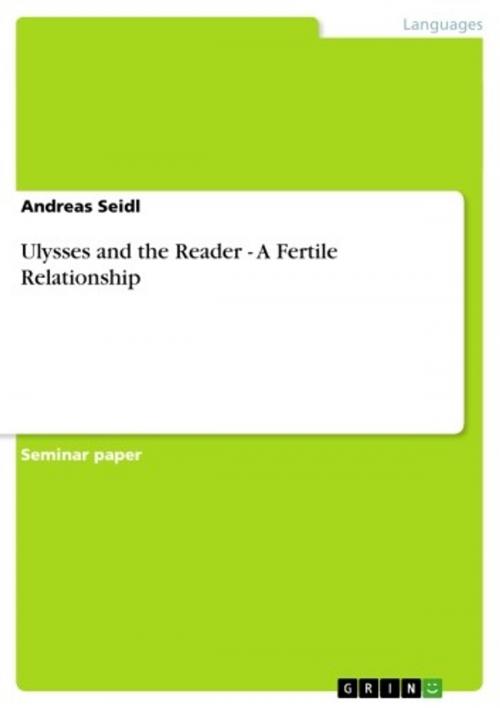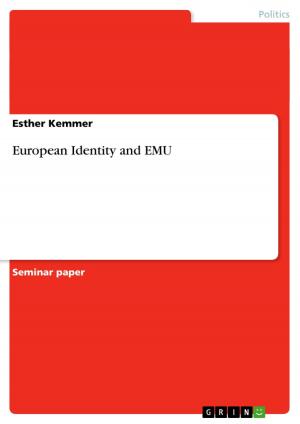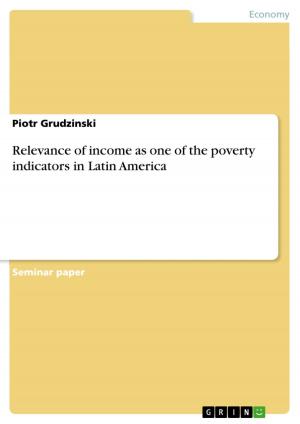Ulysses and the Reader - A Fertile Relationship
Fiction & Literature, Literary Theory & Criticism, British| Author: | Andreas Seidl | ISBN: | 9783638196932 |
| Publisher: | GRIN Publishing | Publication: | June 5, 2003 |
| Imprint: | GRIN Publishing | Language: | English |
| Author: | Andreas Seidl |
| ISBN: | 9783638196932 |
| Publisher: | GRIN Publishing |
| Publication: | June 5, 2003 |
| Imprint: | GRIN Publishing |
| Language: | English |
Seminar paper from the year 2003 in the subject English - Literature, Works, grade: 70 of 80 Points; First Honour, University College Dublin (Department of English), course: James Joyce's Ulysses, 12 entries in the bibliography, language: English, abstract: There is a frequently recurring theme in mythological (and most of all in religious) narratives: the sacrifice of a god. The Aztec god Nanahuatl sacrifices himself to give rise to a new sun in the east; Christ sacrifices his body to redeem mankind from mortal sin; Odin sacrifices his physical form to gain superior knowledge. In Ulysses, the omnipotent and omnipresent god of the narrative, the author, sacrifices parts of his power to give birth to a new form of fictional universe. The creator of the artificial reality systematically deconstructs his most powerful means of structuring and ordering the imagined world: the literary device of the narrator. In Joyce's modern mythology, it is this device which is exposed to the reader as being not reliable, for the narrator becomes subject to the relativity of his position within the discourse of the text, he changes his form, he vanishes almost totally only to come back in the guise of an actual character of the novel, and sometimes intermingles with the thoughts of characters, which renders him hard to be identified at all. This state of the narrator, in combination with Joyce's effort '...to put in so many enigmas and puzzles that it will keep the professors busy for centuries....', his use of different stylistic modes, his frequent allusions to other works of literature and his subversion of the conventional notion of time and space, produces an effect on the reader, which is not to be experienced in similar degree with works predating the publishing of Ulysses: the effect of incertitude. Readers see themselves confronted with a seemingly incoherent fictional world, in which the ancièn regime of authorial order has been subject to a literary coup d' état and has been replaced by a democratic system of polyphonic quality. To highlight some basic concepts of incertitude, refer to potential patterns of order, cast light on one possible way of handling the fictional universe, which seems to be, in words borrowed from Pope, 'a mighty maze, a maze without plan', and point to the readers role in enacting the play of the text shall be the predominant aims of this essay.
Seminar paper from the year 2003 in the subject English - Literature, Works, grade: 70 of 80 Points; First Honour, University College Dublin (Department of English), course: James Joyce's Ulysses, 12 entries in the bibliography, language: English, abstract: There is a frequently recurring theme in mythological (and most of all in religious) narratives: the sacrifice of a god. The Aztec god Nanahuatl sacrifices himself to give rise to a new sun in the east; Christ sacrifices his body to redeem mankind from mortal sin; Odin sacrifices his physical form to gain superior knowledge. In Ulysses, the omnipotent and omnipresent god of the narrative, the author, sacrifices parts of his power to give birth to a new form of fictional universe. The creator of the artificial reality systematically deconstructs his most powerful means of structuring and ordering the imagined world: the literary device of the narrator. In Joyce's modern mythology, it is this device which is exposed to the reader as being not reliable, for the narrator becomes subject to the relativity of his position within the discourse of the text, he changes his form, he vanishes almost totally only to come back in the guise of an actual character of the novel, and sometimes intermingles with the thoughts of characters, which renders him hard to be identified at all. This state of the narrator, in combination with Joyce's effort '...to put in so many enigmas and puzzles that it will keep the professors busy for centuries....', his use of different stylistic modes, his frequent allusions to other works of literature and his subversion of the conventional notion of time and space, produces an effect on the reader, which is not to be experienced in similar degree with works predating the publishing of Ulysses: the effect of incertitude. Readers see themselves confronted with a seemingly incoherent fictional world, in which the ancièn regime of authorial order has been subject to a literary coup d' état and has been replaced by a democratic system of polyphonic quality. To highlight some basic concepts of incertitude, refer to potential patterns of order, cast light on one possible way of handling the fictional universe, which seems to be, in words borrowed from Pope, 'a mighty maze, a maze without plan', and point to the readers role in enacting the play of the text shall be the predominant aims of this essay.















